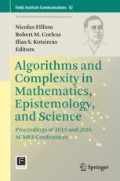Abstract
Mathematics and ethics are surprisingly similar. To some extent this is obvious, since neither looks to laboratory experiments nor sensory experience of any kind as a source of evidence. Both are based on reason and something commonly call “intuition.” This is not all. Interestingly, mathematics and ethics both possess similar distinctions between pure and applied. I explore some of the similarities and draw methodological lessons from them. We can use these lessons to explore how and why Freiling’s refutation of the continuum hypothesis might be justified.
Access this chapter
Tax calculation will be finalised at checkout
Purchases are for personal use only
Notes
- 1.
- 2.
For more on this see [1].
- 3.
See Borwein’s home page for his several books, articles, and various projects: https://www.carma.newcastle.edu.au/jon/.
- 4.
For more detail, see [19], an early and influential source.
- 5.
Rob Corless points out that with computers we can “zoom in” on a function and get a better look at the slope. So, (7) is arguably not so metaphorical, after all.
References
Brown JR (2017) Proofs and guarantees. Math Intell 39(4):47–50. https://doi.org/10.1007/s00283-017-9730-1
Clark-Doane (2012) Morality and mathematics. Ethics 122:313–340
Cohen P (1963) Set theory and the continuum hypothesis. W.A. Benjamin, New York
Foot P (1958) Moral arguments. Mind 67(268):502–513
Franklin J (2004) On the parallel between mathematics and morals. Philosophy 79:97–119
Freiling C (1986) Axioms of symmetry: throwing darts at the real number line. J Symb Log 51:190–200
Gödel K (1938) The consistency of the axiom of choice and the generalized continuum hypothesis. Proc Natl Acad Sci U S A 24:556–557
Gödel K (1939) Consistency proof of the axiom of choice and the generalized continuum hypothesis. Proc Natl Acad Sci U S A 25:220–224
Greene JD, Sommerville RB, Nystrom LE, Darley JM, Cohen JD (2001) An fMRI investigation of emotional engagement in moral judgment. Science 293:2105–2108
Hardy H (1944) A mathematician’s apology. Cambridge University Press, Cambridge
Kac M (1966) Can one hear the shape of a drum. Am Math Mon 73(4, part 2):1–23
Leibowitz UD, Sinclair N (eds) (2016) Explanation in ethics and mathematics: debunking and dispensability. Oxford University Press, Oxford
Leng M (2016) Naturalism and placement, or, what should a good Quinean say about mathematical and moral truth? Proc Aristot Soc cxvi, Part 3. https://doi.org/10.1093/arisoc/aow014
Manin Y (2002) Georg Cantor and his heritage. arXiv:math.AG/0209244 v1
Mumford D (2000) Dawning of the age of stochasticity. In: Arnold V (ed) Mathematics: frontiers and perspectives. American Mathematical Society, New York
Spivak M (1994) Calculus. Publish or Perish
Thomson JJ (1971) A defense of abortion. Philos Public Aff 1(1):47–66
Thurston W (1994) On proof and progress in mathematics. Bull Am Math Soc 30(2):161–174
Williams B (1985) Ethics and the limits of philosophy. Harvard University Press, Cambridge
Further Reading
Brown JR (1999/2008) Philosophy of mathematics: a contemporary introduction to the world of proofs and pictures, 2nd edn. Routledge, London/New York
Elstein DY, Hurka T (2009) From thick to thin: two moral reduction plans. Can J Philos 39(4):5-5-536
Gödel K (1951) Some basic theorems of the foundations of mathematics and their implications. Reprinted in Feferman, et al. Gödel: collected works, vol III, Oxford (1995)
Gödel K (1964) What is Cantor’s continuum problem? Reprinted in Feferman et al. Gödel: collected works, vol II, Oxford (1995)
Hurka T (2014) British ethical theorists from Sidgwick to Ewing. Oxford University Press, Oxford
Jaffe A, Quinn F (1993) ‘Theoretical mathematics’: toward a cultural synthesis of mathematics and theoretical physics. Bull Am Math Soc 29(1):1–13
Moore GE (1903) Principia ethica. Cambridge University Press, Cambridge
Robinson JA (2000) Proof= Guarantee+ Explanation. In: Intellectics and computational logic (to Wolfgang Bibel on the occasion of his 60th birthday. Kluwer, Dordrecht, pp 277–294
Acknowledgements
Thanks to Paul Bartha, Philipp Berghofer, Mark Colyvan, Rob Corless, Nic Fillion, Chris Freiling, Tom Hurka, Tracy Issacs, Mary Leng, Kathleen Okruhlik, Debbie Roberts, Zvonimir Šikić, John Sipe, Alan Sokal, and Harald Wiltsche for discussions of various issues including information about ethical intuitions and the thin-thick distinction. Thanks also to an anonymous referee who provided several useful remarks. Finally, I am grateful to various audiences who heard versions of this material, especially at the ACMES conference at The University of Western Ontario, May 12–15, 2016.
Author information
Authors and Affiliations
Corresponding author
Editor information
Editors and Affiliations
Rights and permissions
Copyright information
© 2019 Springer Science+Business Media, LLC, part of Springer Nature
About this paper
Cite this paper
Brown, J.R. (2019). Ethics and the Continuum Hypothesis. In: Fillion, N., Corless, R., Kotsireas, I. (eds) Algorithms and Complexity in Mathematics, Epistemology, and Science. Fields Institute Communications, vol 82. Springer, New York, NY. https://doi.org/10.1007/978-1-4939-9051-1_1
Download citation
DOI: https://doi.org/10.1007/978-1-4939-9051-1_1
Published:
Publisher Name: Springer, New York, NY
Print ISBN: 978-1-4939-9050-4
Online ISBN: 978-1-4939-9051-1
eBook Packages: Mathematics and StatisticsMathematics and Statistics (R0)

